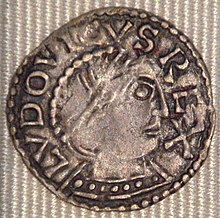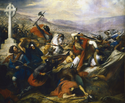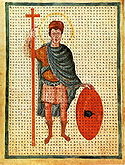Louis IV of France: Difference between revisions
m robot Adding: sh:Luj IV., kralj Francuske |
No edit summary |
||
| Line 6: | Line 6: | ||
==Return to France== |
==Return to France== |
||
Charles died in 929, but Rudolph ruled on until 936, when Louis was summoned back to France unanimously by the nobles, especially [[Hugh the Great]], who had probably organised his return to prevent Herbert II, or Rudolph's brother [[Hugh, Duke of Burgundy|Hugh the Black]], taking the throne. He was crowned king at [[Laon]] by [[Artald, Archbishop of Rheims|Artald]], [[archbishop of Rheims]], on Sunday [[19 June]] [[936]]. The chronicler [[Flodoard]] records the events as follows: |
Charles died in 929, but Rudolph ruled on until 936, when Louis was summoned back to France unanimously by the nobles, especially [[Hugh the Great]], who had probably organised his return to prevent Herbert II, or Rudolph's brother [[Hugh, Duke of Burgundy|Hugh the Black]], taking the throne. He was crowned king at [[Laon]] by [[Artald, Archbishop of Rheims|Artald]], [[archbishop of Rheims]], on Sunday [[19 June]] [[936]].The coronation ceremony was held in the abbey church of Saint Vincent of Laon, his hometown and stronghold of his family Carolingian. The chronicler [[Flodoard]] records the events as follows: |
||
{| |
{| |
||
| Line 12: | Line 12: | ||
| "The Bretons, returning from the lands across the sea with the support of [[Athelstan of England|King Athelstan]], came back to their country. Duke Hugh sent across the sea to summon Louis, son of Charles, to be received as king, and King Athelstan, his uncle, first taking oaths from the legates of the Franks, sent him to the Frankish kingdom with some of his bishops, and other followers. Hugh and the other nobles of the Franks went to meet him and committed themselves to him[;] immediately he disembarked on the sands of Boulogne, as had been agreed on both sides. From there he was conducted by them to [[Laon]], and, endowed with the royal benediction, he was anointed and crowned by the lord Archbishop Artold, in the presence of the chief men of his kingdom, with 20 bishops."<ref>Dorothy Whitelock (tr.), ''English Historical Documents c. 500-1042''. 2<sup>nd</sup> ed. London, 1979. p. 344.</ref> |
| "The Bretons, returning from the lands across the sea with the support of [[Athelstan of England|King Athelstan]], came back to their country. Duke Hugh sent across the sea to summon Louis, son of Charles, to be received as king, and King Athelstan, his uncle, first taking oaths from the legates of the Franks, sent him to the Frankish kingdom with some of his bishops, and other followers. Hugh and the other nobles of the Franks went to meet him and committed themselves to him[;] immediately he disembarked on the sands of Boulogne, as had been agreed on both sides. From there he was conducted by them to [[Laon]], and, endowed with the royal benediction, he was anointed and crowned by the lord Archbishop Artold, in the presence of the chief men of his kingdom, with 20 bishops."<ref>Dorothy Whitelock (tr.), ''English Historical Documents c. 500-1042''. 2<sup>nd</sup> ed. London, 1979. p. 344.</ref> |
||
|} |
|} |
||
Louis |
|||
invaded Lorrain in 938 at the request of its duke, Gilbert (Giselbert). But |
|||
the results of this firm and decided course were the same as in the case |
|||
of Charles the Simple. The party of opposition gathered again around |
|||
Hugh the Great and [[Herbert II of Vermandois]], whom a common hostility |
|||
drew together. The Carolingian's chief support lay in [[Artald, Archbishop of Rheims|Artald]], Archbishop |
|||
of Rheims. |
|||
The rebels marched straight upon Rheims. The place made but a faint resistance, Hugh the Great and Herbert entering it after brief delay. [[Artald, Archbishop of Rheims|Artald]] was driven from his see and sent to the monastery of St Basle . But [[Artald, Archbishop of Rheims|Artald]] fled from the his monastery and joint to king . The rebels proceeded to besiege Laon. Louis , In company with [[Artald, Archbishop of Rheims|Artald]] , defended himself vigorously. But his bold attempt upon Lorraine had resulted in drawing [[Otto I, Holy Roman Emperor]], the new King of Germany, towards Hugh the Great and Herbert. At their request he entered France, stopping at the palace of Attigny to receive their homage, and for a short time even pitching his camp on the banks |
|||
of the Seine (940). |
|||
after defeat in the Ardennes by Hugh and Herbert, Louis forced to flee into the kingdom of Burgundy, cut off from [[Artald, Archbishop of Rheims|Artald]](who had been deposed in a synod held at Rheims, and again shut up in the monastery of St Basle, while his rival Hugh obtained the confirmation of his dignity from the Holy See). But conditions have changed and Hugh the Great was deserted by Otto, and then Louis and Otto had an interview at Vise on the Meuse, in the month of November 942, at which their reconciliation was sealed. Simultaneously, Pope Stephen VIII raised his voice in favour of the Carolingian, ordering all the inhabitants of the kingdom to recognise Louis afresh as king, and declaring that |
|||
"if they did not attend to his warnings and continued to pursue the king in arms, he would pronounce them excommunicate." Hugh the Great consented to make his submission. Soon afterwards the death of [[Herbert II of Vermandois]] was to rid Louis of one of his most dangerous |
|||
enemies (943). |
|||
In 945 Louis captured by the Normans but Hugh quickly realised him . As soon as he was set at liberty, Louis appealed to [[Otto I, Holy Roman Emperor]]. The kings joined in re-taking Rheims, drove out the Archbishop, Hugh of Vermandois, and restored [[Artald, Archbishop of Rheims|Artald]](946). Then in June 948 a solemn council assembled on German soil at Ingelheim, under the presidency of the Pope's legate, to consider the situation. The kings, Louis and Otto, appeared there side by side. Hugh of Vermandois was excommunicated.After Herbert Pope , excommunicated Hugh to make reparation to Louis. It was not, however, until 950 that the powerful vassal became reconciled with his suzerain and restored Laon. But new difficulties arose, and peace was not finally concluded until 953. |
|||
Effectively, his sovereignty was limited to the town of Laon and to some places in the north of France, Louis displayed a keenness beyond his years in obtaining the recognition of his authority by his feuding nobles. Nonetheless, his reign was filled with conflict; in particular with Hugh the Great, [[count of Paris]]. |
Effectively, his sovereignty was limited to the town of Laon and to some places in the north of France, Louis displayed a keenness beyond his years in obtaining the recognition of his authority by his feuding nobles. Nonetheless, his reign was filled with conflict; in particular with Hugh the Great, [[count of Paris]]. |
||
| Line 72: | Line 89: | ||
==References== |
==References== |
||
*[[Flodoard]], ''Annales'', ed. Philippe Lauer, ''Les Annales de Flodoard''. Collection des textes pour servir à l'étude et à l'enseignement de l'histoire 39. Paris: Picard, 1905. |
*[[Flodoard]], ''Annales'', ed. Philippe Lauer, ''Les Annales de Flodoard''. Collection des textes pour servir à l'étude et à l'enseignement de l'histoire 39. Paris: Picard, 1905. |
||
* [[H. M. Gwatkin|Gwatking, H. M.]], [[J. P. Whitney|Whitney, J. P.]], et al. ''Cambridge Medieval History: Volume III—Germany and the Western Empire''. [[Cambridge University Press]]: [[London]], 1930. |
|||
{{Familypedia|Louis IV (c920-954)}} |
{{Familypedia|Louis IV (c920-954)}} |
||
Revision as of 10:19, 12 October 2009

Louis IV (10 September 920 – 30 September 954), called d'Outremer or Transmarinus (both meaning "from overseas"), reigned as King of Western Francia from 936 to 954. He was a member of the Carolingian dynasty, the son of Charles III and Eadgifu of England, a daughter of King Edward the Elder.
Early years across the sea
He was only two years old when his father was deposed by the nobles, who set up Robert I in his place. When he was only three years old, Robert died and was replaced by Rudolph, duke of Burgundy. Rudolph's ally, a Carolingian himself, Count Herbert II of Vermandois, took Charles captive by treachery and the young Louis's mother took the boy "over the sea" to the safety of England, hence his nickname.
Return to France
Charles died in 929, but Rudolph ruled on until 936, when Louis was summoned back to France unanimously by the nobles, especially Hugh the Great, who had probably organised his return to prevent Herbert II, or Rudolph's brother Hugh the Black, taking the throne. He was crowned king at Laon by Artald, archbishop of Rheims, on Sunday 19 June 936.The coronation ceremony was held in the abbey church of Saint Vincent of Laon, his hometown and stronghold of his family Carolingian. The chronicler Flodoard records the events as follows:
| Brittones a transmarinis regionibus, Alstani regis praesidio, revertentes terram suam repetunt. Hugo comes trans mare mittit pro accersiendo ad apicem regni suscipiendum Ludowico, Karoli filio, quem rex Alstanus avunculus ipsius, accepto prius jurejurando a Francorum legatis, in Franciam cum quibusdam episcopis et aliis fidelibus suis dirigit, cui Hugo et cetero Francorum proceres obviam profecti, mox navim egresso, in ipsis littoreis harenis apud Bononiam, sese committunt, ut erant utrinque depactum. Indeque ab ipsis Laudunum deductus ac regali benedictione didatus ungitur atque coronatur a domno Artoldo archiepiscopo, praesentibus regni principibus cum episcopis xx et amplius.[1] | "The Bretons, returning from the lands across the sea with the support of King Athelstan, came back to their country. Duke Hugh sent across the sea to summon Louis, son of Charles, to be received as king, and King Athelstan, his uncle, first taking oaths from the legates of the Franks, sent him to the Frankish kingdom with some of his bishops, and other followers. Hugh and the other nobles of the Franks went to meet him and committed themselves to him[;] immediately he disembarked on the sands of Boulogne, as had been agreed on both sides. From there he was conducted by them to Laon, and, endowed with the royal benediction, he was anointed and crowned by the lord Archbishop Artold, in the presence of the chief men of his kingdom, with 20 bishops."[2] |
Louis invaded Lorrain in 938 at the request of its duke, Gilbert (Giselbert). But the results of this firm and decided course were the same as in the case of Charles the Simple. The party of opposition gathered again around Hugh the Great and Herbert II of Vermandois, whom a common hostility drew together. The Carolingian's chief support lay in Artald, Archbishop of Rheims.
The rebels marched straight upon Rheims. The place made but a faint resistance, Hugh the Great and Herbert entering it after brief delay. Artald was driven from his see and sent to the monastery of St Basle . But Artald fled from the his monastery and joint to king . The rebels proceeded to besiege Laon. Louis , In company with Artald , defended himself vigorously. But his bold attempt upon Lorraine had resulted in drawing Otto I, Holy Roman Emperor, the new King of Germany, towards Hugh the Great and Herbert. At their request he entered France, stopping at the palace of Attigny to receive their homage, and for a short time even pitching his camp on the banks of the Seine (940).
after defeat in the Ardennes by Hugh and Herbert, Louis forced to flee into the kingdom of Burgundy, cut off from Artald(who had been deposed in a synod held at Rheims, and again shut up in the monastery of St Basle, while his rival Hugh obtained the confirmation of his dignity from the Holy See). But conditions have changed and Hugh the Great was deserted by Otto, and then Louis and Otto had an interview at Vise on the Meuse, in the month of November 942, at which their reconciliation was sealed. Simultaneously, Pope Stephen VIII raised his voice in favour of the Carolingian, ordering all the inhabitants of the kingdom to recognise Louis afresh as king, and declaring that "if they did not attend to his warnings and continued to pursue the king in arms, he would pronounce them excommunicate." Hugh the Great consented to make his submission. Soon afterwards the death of Herbert II of Vermandois was to rid Louis of one of his most dangerous enemies (943).
In 945 Louis captured by the Normans but Hugh quickly realised him . As soon as he was set at liberty, Louis appealed to Otto I, Holy Roman Emperor. The kings joined in re-taking Rheims, drove out the Archbishop, Hugh of Vermandois, and restored Artald(946). Then in June 948 a solemn council assembled on German soil at Ingelheim, under the presidency of the Pope's legate, to consider the situation. The kings, Louis and Otto, appeared there side by side. Hugh of Vermandois was excommunicated.After Herbert Pope , excommunicated Hugh to make reparation to Louis. It was not, however, until 950 that the powerful vassal became reconciled with his suzerain and restored Laon. But new difficulties arose, and peace was not finally concluded until 953.
Effectively, his sovereignty was limited to the town of Laon and to some places in the north of France, Louis displayed a keenness beyond his years in obtaining the recognition of his authority by his feuding nobles. Nonetheless, his reign was filled with conflict; in particular with Hugh the Great, count of Paris.
Louis IV fell from his horse and died September 10, 954, at Rheims, in the Marne, and is interred there at Saint Rémi Basilica.
Ancestry
| Family of Louis IV of France | ||||||||||||||||||||||||||||||||||||||||||||||||||||||||||||||||||||||||||||||||||||||||||||||||||||||||||||||||||||||||||||||||||||||||||||||||||||||||||||||||||||||||||||||||||||||||||||||||||||||||||||||||||||||||||||||||||||||||||||||||||||||||||||||||||||||||||||||||||||||||||||||||||||||||||||||||||||||||||||||||||||||||||||||||||||||||||||||||||||||||||||||||||||||||||||||||||||||||||||||||||||||||||||||||||||||||||||||||||||||||||||||||||||||||||||||||||||||||||||||||||||||||||||||||||||||||||||||||||||||||||||||||||||||||||||||||||||||||||||||||||||||||||||||||
|---|---|---|---|---|---|---|---|---|---|---|---|---|---|---|---|---|---|---|---|---|---|---|---|---|---|---|---|---|---|---|---|---|---|---|---|---|---|---|---|---|---|---|---|---|---|---|---|---|---|---|---|---|---|---|---|---|---|---|---|---|---|---|---|---|---|---|---|---|---|---|---|---|---|---|---|---|---|---|---|---|---|---|---|---|---|---|---|---|---|---|---|---|---|---|---|---|---|---|---|---|---|---|---|---|---|---|---|---|---|---|---|---|---|---|---|---|---|---|---|---|---|---|---|---|---|---|---|---|---|---|---|---|---|---|---|---|---|---|---|---|---|---|---|---|---|---|---|---|---|---|---|---|---|---|---|---|---|---|---|---|---|---|---|---|---|---|---|---|---|---|---|---|---|---|---|---|---|---|---|---|---|---|---|---|---|---|---|---|---|---|---|---|---|---|---|---|---|---|---|---|---|---|---|---|---|---|---|---|---|---|---|---|---|---|---|---|---|---|---|---|---|---|---|---|---|---|---|---|---|---|---|---|---|---|---|---|---|---|---|---|---|---|---|---|---|---|---|---|---|---|---|---|---|---|---|---|---|---|---|---|---|---|---|---|---|---|---|---|---|---|---|---|---|---|---|---|---|---|---|---|---|---|---|---|---|---|---|---|---|---|---|---|---|---|---|---|---|---|---|---|---|---|---|---|---|---|---|---|---|---|---|---|---|---|---|---|---|---|---|---|---|---|---|---|---|---|---|---|---|---|---|---|---|---|---|---|---|---|---|---|---|---|---|---|---|---|---|---|---|---|---|---|---|---|---|---|---|---|---|---|---|---|---|---|---|---|---|---|---|---|---|---|---|---|---|---|---|---|---|---|---|---|---|---|---|---|---|---|---|---|---|---|---|---|---|---|---|---|---|---|---|---|---|---|---|---|---|---|---|---|---|---|---|---|---|---|---|---|---|---|---|---|---|---|---|---|---|---|---|---|---|---|---|---|---|---|---|---|---|---|---|---|---|---|---|---|---|---|---|---|---|---|---|---|---|---|---|---|---|---|---|---|---|---|---|---|---|---|---|---|---|---|---|---|---|---|---|---|---|---|---|---|---|---|---|---|---|---|---|---|---|---|---|---|---|---|---|---|---|---|---|---|---|---|---|---|---|---|---|---|---|---|---|---|---|---|---|---|---|---|---|---|---|---|---|---|---|---|---|---|---|---|---|---|---|---|---|---|---|---|---|---|---|---|---|---|---|---|---|---|---|---|---|---|---|---|---|---|---|---|---|---|---|---|---|---|---|---|---|---|---|---|---|---|---|---|
| ||||||||||||||||||||||||||||||||||||||||||||||||||||||||||||||||||||||||||||||||||||||||||||||||||||||||||||||||||||||||||||||||||||||||||||||||||||||||||||||||||||||||||||||||||||||||||||||||||||||||||||||||||||||||||||||||||||||||||||||||||||||||||||||||||||||||||||||||||||||||||||||||||||||||||||||||||||||||||||||||||||||||||||||||||||||||||||||||||||||||||||||||||||||||||||||||||||||||||||||||||||||||||||||||||||||||||||||||||||||||||||||||||||||||||||||||||||||||||||||||||||||||||||||||||||||||||||||||||||||||||||||||||||||||||||||||||||||||||||||||||||||||||||||||
Marriage and children
In 939, Louis became involved in a struggle with the Emperor Otto the Great on the question of Lorraine, but then married Otto's sister Gerberga of Saxony (914 – May 5, 984). They were parents to eight children:
- Lothair of France (941-986)
- Mathilde b. about 943; married Conrad of Burgundy
- Hildegarde b. about 944
- Carloman b. about 945
- Louis b. about 948
- Charles, Duke of Lower Lorraine (953-993)
- Alberade b. before 953
- Henri b. about 953
Notes
References
- Flodoard, Annales, ed. Philippe Lauer, Les Annales de Flodoard. Collection des textes pour servir à l'étude et à l'enseignement de l'histoire 39. Paris: Picard, 1905.
- Gwatking, H. M., Whitney, J. P., et al. Cambridge Medieval History: Volume III—Germany and the Western Empire. Cambridge University Press: London, 1930.




